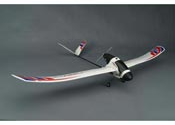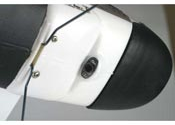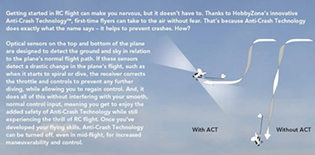Anti-Crash Technology
I have always wanted to fly R/C Planes and I finally decided that it was time to give it a try... So, the first thing I did was make a trip to the local hobby shop to get a plane. My goal was to find a kit within my price range that had everything I needed to build and fly my first plane. I am pretty handy with electronics - so I knew I was looking for an electric plane. The materials for the plane itself did not matter to me, since I am experienced at working with balsa, plastic, and foam. I had it all figured out...
After looking around at all of the options at the hobby shop, I decided on a nice little piper cub for my first plane. It was electric and the kit contained everything you needed to fly it right out of the box - all you had to do was assemble it. After carrying it to the register, the owner of the hobby shop started to ask me a bunch of questions...
He wanted to know how long I had been flying. ("Well, I am just getting started...") He wanted to know what club I was a part of. ("Hmm, I am not part of any club...") After talking with him for a few minutes, he began to give me some good advice. He suggested that I not start out with this particular plane and that I really shouldn't build my first plane anyway! He suggested that I get connected with a local club to get some help/ lessons. He then took back over to their wonderful selection of planes and started to suggest a few models to me.
The planes he was suggesting to me did not appeal to me. They were mostly styrofoam planes with minimal control. The only assembly required was to attach the wings with some rubber bands. I explained my experience with R/C cars and models - building a plane was not going to be a problem for me and was a large part of the excitement. He then gave me some more advice...
He explained that to build a plane takes a lot of time and effort. ("I expected that...") I wouldn't even have a plane ready to fly for weeks. ("I am pretty patient..") He then told me that I would crash my first plane(s) many times... Crashing a plane that you have invested a lot into is really discouraging and most beginners never get back into the sport.
Now hold on, I am great at flight sims on the computer. I have a lot of R/C car experience. I even have a couple of cheap helicopters that I can maneuver around very well. I thought I would have no trouble flying a plane...
After much frustration at this "help", I finally listened to reason and went home with a Firebird Freedom from HobbyZone. This is a beginner plane for children 12+ that features “Anti-Crash Technology”. I was disappointed that I wouldn’t be building my first plane and especially that this plane didn’t look like it would be much fun with its limited control and anti-crash technology.

Here is a link to the official page for the plane with all of the details on the features: Firebird Freedom
This is how it works… The plane has two sensors on it – one on the top and one on the bottom. The top sensor can tell when it is looking at the bright open sky, while the bottom sensor is looking for the darker ground and trees below. If either of the sensors “sense” that they are seeing the wrong thing, the plane shuts off the control from the radio and takes control of itself. It will slow itself down and level itself out, then give you back control of the plane… Does that sound great or what?


Zzzzzzzzzzzzzzzzz… !
With all of the advertising, like the plane can fly itself, I had the plane ready to go and in the air less than an hour after I got home. After about a minute in the air – with its large motors buzzing – I had gotten the attention of the entire neighborhood. Everyone glanced up in awe… just in time to watch the first crash. I quickly ran over to the edge of our yard to inspect the plane. Except for a few scratches the plane looked in good order, so I hand launched it a second time and again had it flying overhead grabbing the neighborhood’s attention. After another minute of flying things started to get out of hand and again it crashed.
I launched the plane three more times with the same results. Once landing in the neighbors corn field, once in a tree, and once on our other neighbor’s deck (that was a close one). After the 5th crash it was in pretty bad shape and I decided that there was no way it was going to fly right in the condition it was in anyway… so, I took the plane inside.
I then started to read through the entire manual over and over looking for the problem… the solution… It must be a guy thing that had me checking out the instructions after I had a major problem. This time – it wasn’t my fault though. The anti-crash technology was turned on. The weather was fine. The space I was flying in was adequate for the plane. I had done everything right. So, why did I have so much trouble?
After searching the internet, I came across many forum posts discussing the Firebird Freedom and HobbyZone’s “Anti-Crash Technology”. Most of the posts from experienced flyers encouraged you to stay away from the plane. Explaining that the Anti-Crash Technology doesn’t work and actually creates more trouble for you. It was a great idea in concept but wasn't very realistic. They suggested turning off the feature and modifying the plane a little, which is what most of these experts had to do to get the plane to fly at all.

I had put all my faith in this anti-crash feature but it just wasn’t that simple. In fact, the hobby store owner had done the same thing when he sold me the plane. After reading a lot of information online and following the advice of several expert flyers, I finally got the plane to stay up in the air (a little longer). It took great effort on my part to have success and fun with my plane - and I am still learning more and more all the time.
In the life of the Christian, it is easy to rely on “anti-crash technology”. Many people think if they just hang out in the right places, make friends with the right people, and go to the right meetings, everything will take care of itself with little personal effort. Just like flying R/C planes, it just isn’t that simple. It takes great personal effort to live a life that is holy before God.
Checking out God’s “instruction manual” for us is a great place to start. Why not read it before there is a problem?
(You can study the Bible along with us by committing
yourself to The Daily Charge devotional program.)
|

